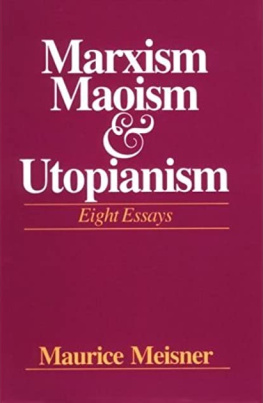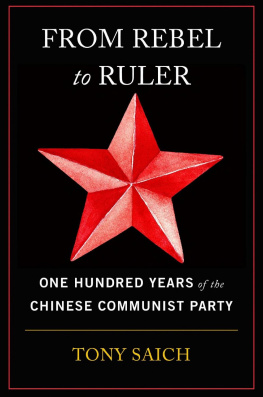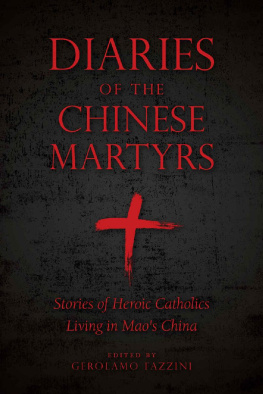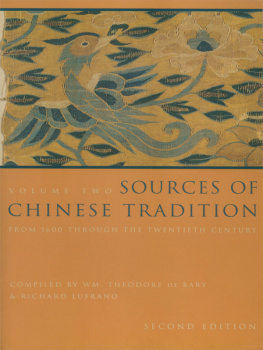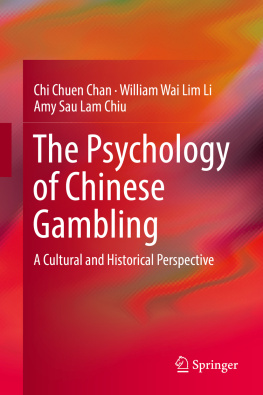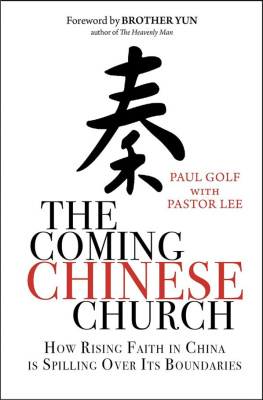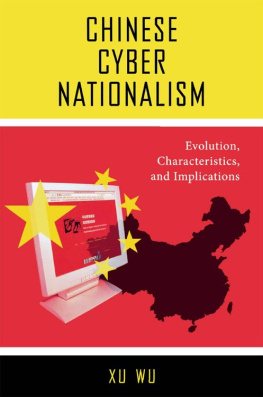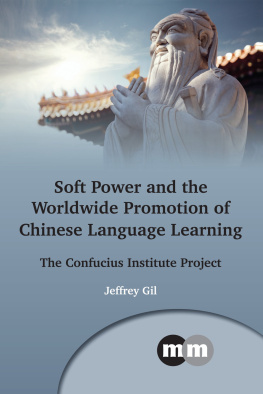THE RED BOOK OF CHINESE MARTYRS
THE RED BOOK
OF
CHINESE MARTYRS
Testimonies and Autobiographical Accounts
EDITED BY GEROLAMO FAZZINI
Translated by
Michael Miller
With a Preface by Joseph Cardinal Zen
Bishop of Hong Kong
IGNATIUS PRESS SAN FRANCISCO
Original Italian edition:
Il Libro Rosso Dei Martiri Cinesi
2006 by Edizoni San Paolo, Milan
Cover art:
Narrative account by Gertrude Li Minwen
smuggled out of prison in a shoe
Pontifical Institute for Foreign Missions (PIME)
Cover design by Edizioni San Paolo
2009 by Ignatius Press, San Francisco
All rights reserved
ISBN-978-1-58617-244-2
Library of Congress Control Number 2008936285
Printed in the United States of America
CONTENTS
PREFACE
I am not only happy but also honored to be able to present to Italian readers II libro rosso dei martiri cinesi [The Red Book of Chinese Martyrs]. I hope that my words are not taken as a rhetorical gesture. It is truly an honor and a privilege to be able to give voice to the many brothers and sisters of my people who have suffered, often to the point of martyrdom, under a very severe and sometimes ruthless persecution. As I write I experience the same sentiments as I did several months ago when the Holy Father Benedict XVI elevated me to the rank of cardinal in February of 2006. While I was in Rome, I celebrated a Mass (broadcast by Vatican Radio) for the Catholics of my nation, China, in which I recalled: The color red that I wear expresses the willingness of a cardinal to shed his own blood. But it is not my blood that has been shed: it is the blood and tears of the many unnamed heroes of both the official and the underground Church who have suffered for being faithful to the Church.
Of the numerous Catholics who have been imprisoned for thirty years or more in China, quite a few have left us their memoirs. Many of these have been kept in a drawer for a long period of time. There were valid reasons for doing so: no one wanted to run afoul of the political authorities and to put even more of our Catholic brethren in danger. Yet I must admit that there was also a sort of reluctance, even on the part of Church members, to denounce openly the persecutions experienced during the Mao regime. For many years Maoism has been extolled beyond any reasonable bounds. Even those who did not agree with it did not have the courage, or the interior freedom, to speak outside of the ideological choir, perhaps because they feared being numbered among the reactionaries.
To continue today on the path of silence would be an incomprehensible and unpardonable error. As John Paul II often reminded us, we have the duty to remember without further reticence all the martyrs under any regime whatsoever, particularly the martyrs of the twentieth century.
The confessors and martyrs of the Church of China belong to Christianity as a whole, and it is our duty, as well as our right, to present their testimonies so that they might nourish the faith of Christians throughout the world.
Aside from all these considerations, the victimsor better, the protagonistsof that phase of persecution are now vanishing. There is no longer any real reason to remain silent. And so I hope that the young Chinese priests and lay faithful will gather from the lips of their elders the stories of suffering and martyrdom that have not yet been recorded; otherwise the memory of them may be lost forever. This harvest of memory, I believe, is one of the services that young Chinese Catholics can render to our church, to our nation and to the universal Church.
I realize that this book, among the first of its kind, compiles only a fraction of the available testimonies. Be that as it may, the collection presented here is of great human and spiritual value, and I offer my heartfelt congratulations to those who planned and executed this editorial initiative.
As Bishop of Hong Kong, I feel particularly obliged to point out the connections between some of the protagonists of this book and the Church of Hong Kong.
Father Francis Tan Tiande, a student at Aberdeen regional seminary in Hong Kong, spent thirty years doing extremely hard labor in the midst of cold (as lowas40 F), hunger and depression. He is well-known and revered by the Catholics of Hong Kong, who visit him in nearby Canton in great numbers. Our lay faithful continue to be edified by his fortitude and serenity, which are also so evident in his diary, published in this volume.
Today, thirty years later, every time that I remember those meetings in which I was criticized and denounced, my knees begin to tremble involuntarily to the point that I can hardly remain standing.... How could I have had that courage then? Where did it come from? Every time that I was denounced, the words of Jesus suddenly came to mind: They will lay their hands on you and persecute you... for my names sake. This will be a time for you to bear testimony. Those words are absolutely true, arent they? The followers of Jesus cannot avoid persecutions. Therefore I accepted my sufferings joyfully, knowing that they were not in vain!
Father John Huang Yongmu was a priest of the Diocese of Hong Kong and studied in our Aberdeen seminary. He had been assigned to the district of Haifeng, the area of the diocese located within China, which was cut off after the Communists took power in 1949. He spent the final years of his life with us in Hong Kong, residing near Saint Margaret Church and offering his testimony and his service. He, a southerner, lived through twenty-five terrible years in a labor camp in northern China with arctic temperatures. Besides being a priest, his great crime was being the son of a small landowner. During the Cultural Revolution the factory where he was forced to work became an inferno: more than a thousand detainees despaired and committed suicide.
It is no surprise that the same Father Huang experienced the dark night of faith:
During those periods of the dark night of my soul, caused by the mental and physical stresses of the Communist persecution, I suffered so much that I thought there could not be anything worse. During those spiritual crises, only prayer gave me relief and the strength to persevere. If only I had been able to say Mass at least once! In all three of the prisons in which I was confined, many times I secretly made the Stations of the Cross, meditating on Jesus who suffered even unto death. I felt profound regret that I had not offered all my sufferings for the Church and for the souls in purgatory, as I ought to have done. Sometimes I thought of my seminary days, of the statue of the Blessed Virgin, imagining myself under the arbor that covered the shrine praying to Our Lady of Peace in the freedom and safety of the seminary, calmly reciting the Salve Regina. And then the old demon came over me again to torment me: never again would I be able to see my relatives, my family, my father, my dearest friends...In that environment of hatred and terror there was nothing but enmity and cruel hostility. Oh, that oppressive and fatal Communist prison! But despite everything I was able to say: Salve Regina, Hail, Holy Queen, Mother of mercy, our life, our sweetness and our hope!
The protagonists of the Death March, a very sorrowful Way of the Cross, were the Trappist monks of Our Lady of Consolation, located in Yangjiaping (Hebei), about a hundred kilometers northwest of Beijing. In Hong Kong, on the island of Lantau, we are gifted with the presence of monks who come from the Trappist monastery of Our Lady of Joy, also in the province of Hebei, which in its turn was struck by the fury of the persecution. The testimony of the Trappists, which is highly esteemed by our lay faithful, keeps us from forgetting one of the most atrocious acts of cruelty committed by the Communists against the Catholic community.
Next page
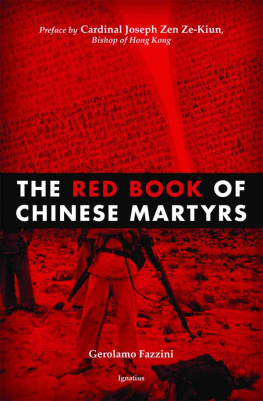

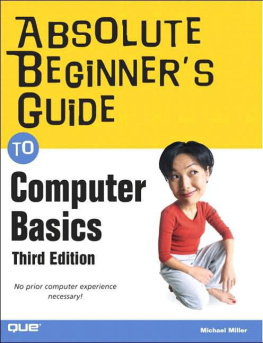


![Michael Miller - Idiots Guides: Music Theory, Third Edition [Book]](/uploads/posts/book/161692/thumbs/michael-miller-idiot-s-guides-music-theory.jpg)

